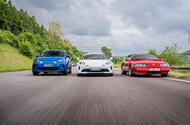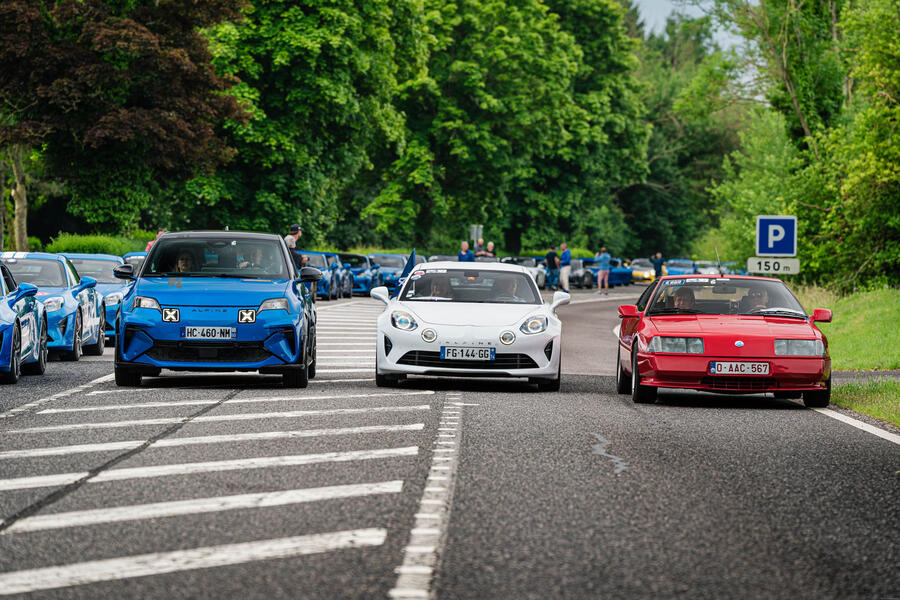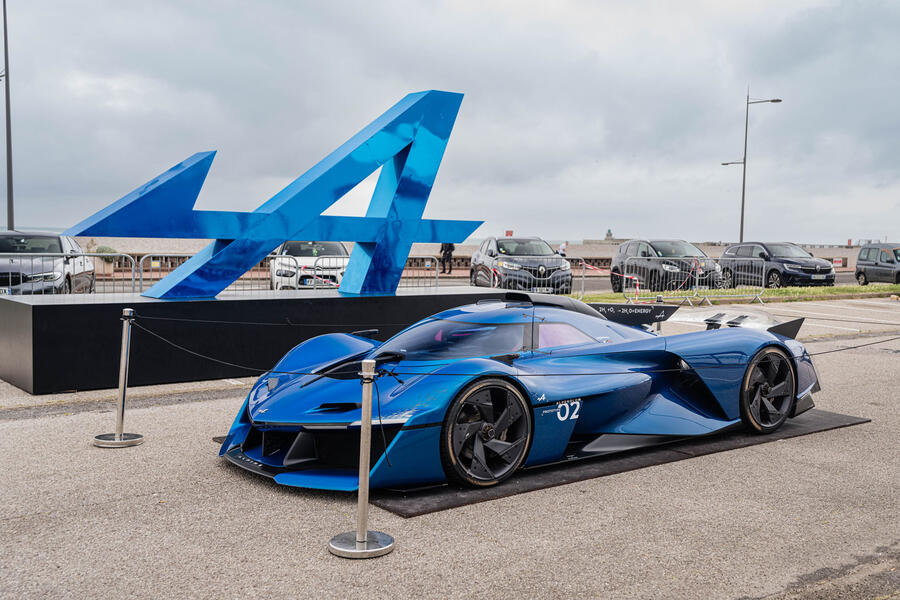Recent Updates
06/06/2025 12:00 PM
The Rotary Correction: Notorious Mazda RX-8 now a sensible bargain
06/06/2025 12:00 PM
Omoda 9
06/06/2025 12:00 PM
BMW plots range-extender revival with 2026 X5
06/06/2025 12:00 PM
Porsche reveals road-legal version of 963 Le Mans racer
06/06/2025 12:00 AM
Volvo software boss to join free Autocar-Siemens webinar on 25 June
06/06/2025 12:00 AM
Nearly four in five UK government cars are still petrol, diesel or hybrid
06/05/2025 12:00 PM
Inside Alpine's 20-year plan to become a proper Porsche rival
06/05/2025 12:00 PM
Volvo reinvents seatbelts - again. Now they know your size
06/05/2025 12:00 PM
Used Land Rover Discovery Sport 2015-2023 review
06/05/2025 12:00 PM
Industry calls for EV retail incentives as fleets drive market growth
EV, Hybrid, Hydrogen, Solar & more 21st century mobility!
 Renault-owned French brand is betting big on its potential to become a credible premium player
Renault-owned French brand is betting big on its potential to become a credible premium player
When Renault Group CEO Luca de Meo walked in through the door of the Covid-wounded company in 2020, premium sports car brand Alpine had its neck on the chopping block.
“We had no plan after the A110; there was no plan for Alpine, basically,†de Meo told journalists at the recent unveiling of the A390.
But de Meo saw Alpine as an important margin-boosting premium asset so set in motion a revival – similar to what he did with Abarth while at the FCA Group and Cupra while at the Volkswagen Group.
The plan was agreed while Renault was still haemorrhaging millions. “It was a bit of a crazy thing," de Meo admitted.Â
Now Alpine’s one-car line-up has been bolstered by the A290, a hot version of the Renault 5, and the new A390, a crossover based on the Renault Scenic platform but given a wallop of power and intriguing handling prospects from three electric motors.
After that, however, Alpine will dive headlong into the murky world of electric sports cars, where customers and profits are mere rumours rather than quantifiable fact. Can the brand really survive a lengthy period of capital-intensive adventuring into the unknown?Â
De Meo is unshakeable even as he admits the scale of the job to create a credible rival to the likes of Porsche. “To launch a premium brand, you need 20 years, minimum,†he said. “It took Audi 25-30 years to be in the club – and every year billions and billions of investment. We're not going to do that in one generation.â€
Renault doesn’t have billions of billions to spend on Alpine and, perhaps more damagingly, the brand’s formative years will be spent in a very different world to the relatively benign place that Audi ultimately flourished in.Â
For one thing, the vast US premium car market is as good as off-limits for newcomers right now, and Alpine has put on ice plans for two bigger electric SUVs that were going to spearhead its launch there.
A single large SUV is still nominally in the pipeline, but it depends on a more welcoming US.Â

“The business case flies with the US, because [the US is] 40% of the market in [the E-segment]. So until we have it clearly, it's a bit risky for us to push the button,†de Meo said.
It also means sourcing a platform from outside Renault – likely Chinese partner firm Geely.
The other global market that welcomed Audi was China, but that too has become a shark tank as local players prey on global incumbents and even each other in a merciless price war. Would Alpine launch there? “Maybe...†CEO Philippe Krief replied with a very Gallic shrug.Â
Krief has plenty of experience in the fickle premium sector after spells at Ferrari, Maserati and Alfa Romeo, and he knows that Alpine has work to do. Right now, the brand has barely left its home country.
"Two thirds of our sales are in France," said Krief. "We need to learn to sell cars to Germany, to the UK, to Korea - markets that are really premium markets. And then we will go to the US.â€
The first 'Atelier Alpine'Â showcase store will open in Barcelona this month, followed by Paris and London later in the year.
Alpine has already doubled its sales this year (to the end of April), thanks to the A290. Sales of the A110 hit 4585 last year, up 5.9%, but the sports car is essentially winding down before bowing out early next year.
Given the model's status as "the [Porsche] 911 of Alpine", in the words of de Meo, all eyes are now on the electric A110, which is due to be revealed at the 2026 Paris motor show.
The A110 traces its roots back to the first rally-bred, lightweight coupés based on the humble Renault 4CV, starting in 1955, and those early Alpines are heavily referenced in the current designs.
The current A110, launched in 2018, has done enough to keep the name alive and enthusiast interest stoked. The hard part now comes with the electric version.
What persuaded de Meo that the plan might work was that all his premium rivals were in the same boat. Regulations meant that, in Europe at least, everyone would have to make the shift.
“The transition to electric vehicles is an opportunity to say, on that kind of technology, more or less, we are on par with the others,†he said. “We don’t have a 100-year gap.â€
De Meo also has a happy knack of understanding customer desires and concerns. “In the beginning, electric cars were kind of ugly, kind of unemotional,†he said. “Maybe we can prove that electric car technology can actually be fun, that we can put the soul in a washing machine.â€
Firstly, we’re promised that new models based on the Alpine Performance Platform (APP) will weigh less than ICE rivals such as the Porsche Boxster, if not the outgoing lightweight aluminium-bodied A110 (a flyweight at 1102kg).
Secondly, Alpine will pioneer in-wheel motors, a potentially game-changing technology that lowers the centre of gravity and frees up room for luxuries like luggage and even rear passengers with the promised 2+2 version.
They can also instantly deliver power to the wheel with the most grip, promising new handling agility. And they can allow the energy-dense batteries to be packaged somewhere other than under the front occupants, giving a more sports car-like driving position.
And thirdly, the platform will have an 800V electrical system to enable ultra-fast charging, negating some range anxiety.
The APP will make its debut underneath the bonkers Renault 5 Turbo 3E, a £135,000 electric hyper-hatchback that's due in limited production next year and produces a claimed 3540 lb ft of torque from its in-wheel motors.
None of this ‘dream garage’ that Alpine is assembling is going to be high-volume. It won’t talk numbers, but given that the A390 is assembled at the same low-volume Dieppe plant as the A110, annual capacity will be 12,000 at best.
The A290 is better placed, with slots in Renault’s vast ElectriCity plant in Douai and a starting price of £33,500 instead of an estimated £60,000 for the A390.
But essentially Alpine is currently in the ‘notice me!’ phase. This is the brand-building slog to catch the eye of the premium buyer, which in Europe is heavily wedded to BMW, Mercedes-Benz and Audi with forays into Land Rover and Volvo.Â
De Meo isn't scrimping on the marketing side of the Alpine revival, having renamed Renault's Formula 1 team to Alpine and batting back any suggestion of selling it, despite a run of poor results; and making Alpine a key player in the World Endurance Championship with the A424 hypercar. “At the core of Alpine is competition activity," he said.
Making a pointed link to the racing will be a 1000bhp hybrid hypercar arriving in around 2028, using a V6-engined drivetrain developed by Hypertech Alpine R&D, the renamed F1 engine facility located at Viry-Châtillon.

The Hypertec division is being used to more aggressively find overlaps between the world of motorsports and road cars – something that car companies have long struggled to achieve.Â
All this work positions Alpine as a sportier premium brand sitting below the luxury players but also, it hopes, apart from the more everyday cars from the German premium brands.
“We are in a sort of in-between space, which is quite empty at the moment,†product chief Sovany Ang told Autocar.
Alpine doesn’t want to be pigeonholed as an EV brand, and the APP can accept combustion engines. “We are not selling electric cars; we are selling sporty cars, passion cars, exclusive cars,†Krief emphasised.
Crucially, Alpine keeps the thread linking to its 70-year-old heritage, giving it that backstory that challenger brands from China lack. “The original position of Alpine was about doing more with less. That’s really in the zeitgeist [of today],†said de Meo.
De Meo speaks about Alpine as a "fully fledged"Â car company with a plant, 2000-odd employees, 159 dealers, an F1 team, a dedicated development centre, an iconic car and a backstory. Krief meanwhile repeated a promise from 2022 that Alpine will be returning 10% profit margins by 2030.Â
Renault has previously promised that Alpine will operate as a standalone company within the group, with its own profit and loss statements, working toward an eventual goal of a stock market floatation.
The appetite for automotive stocks, however, is very different now compared with 2022, and Renault needs all the help it can get countering investor apathy, despite its recent profitable run.
Bolting on a premium brand with the ability to leverage Renault tech and return double-digit margins will aid the group cause no end.
